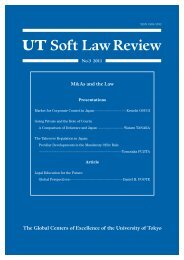UT Soft Law Review
UT Soft Law Review
UT Soft Law Review
Create successful ePaper yourself
Turn your PDF publications into a flip-book with our unique Google optimized e-Paper software.
<strong>UT</strong> <strong>Soft</strong> <strong>Law</strong> <strong>Review</strong> No.2 2010defensive measures with the objective of preventing takeovers which are clearly detrimentalto the shareholder interests.Takeover defense measures that are, contrary to these desired objectives, exploited forthe purpose of managerial entrenchment should not be allowed, and the Corporate ValueStudy Group cannot support such takeover defense measures.In light of the situation where more than 500 Japanese companies have adopted takeoverdefense measures since the establishment of the Guidelines, this report presents the essenceof reasonable takeover defense measures able to gain the understanding and consent oftoday’s shareholders and investors and examines the relationship between such reasonabletakeover defense measures and past judicial precedents.2. Takeover Defense Measures in Recognition of Current EnvironmentFollowing the establishment of the Guidelines, a variety of takeover defense measureswere adopted in Japan. As a result, cases where disputes over takeover defense measures ledto judicial decisions have also appeared. Given this context, the essence of takeover defensemeasures in recognition of the current environment can be described as follows.(1) Granting cash or other financial benefits 3 to the acquirers in implementing takeoverdefense measures invites the actual implementation. 4 As a result, it deprives3 The granting of stock acquisition rights with differential conditions for exercise andcall option clauses tothe acquirers, as takeover defense measures modeling rights plansthat are assumed in this report, isnaturally not included in “cash or other financialbenefits” referred to here.4 Rights plans in the United States are arrangements where the target companies issuestock acquisitionrights to shareholders in advance, and on the occurrence of takeoversthat are detrimental to theshareholder interests, a large number of shares are issued toshareholders other than the acquirers tosubstantially reduce the acquirers’ shareholding ratio. The objective of rights plans, however, is not toultimately detertakeovers through their actual implementation but is to temporarily halt them and to createpressure for discussions between the acquirers and the target companies.Specifically, in the structurewhere their implementation would be disadvantageous tothe acquirers, the acquirers, in order to avoid thisdisadvantage, will need to temporarily halt before commencing takeovers and will need to negotiate withthe boardof directors and shareholders of the target companies for the removal of the stockacquisitionrights. As a result, it enables the board of directors of the target companiesto ensure adequate time andinformation necessary for shareholders to appropriatelydecide whether to support or oppose the takeoversor opportunities for the board ofdirectors of the target companies to negotiate with the acquirers toimprove andenhance takeover terms. Therefore, as long as the acquirers act rationally, rights planswill notbe implemented.Given the above, the granting of cash or other financial benefits to the acquirers willremove thedisadvantage for them resulting from the implementation of takeoverdefense measures, and therefore willeliminate the incentive for the acquirers to temporarily halt before commencing takeovers. As a result, itwill trigger the implementation of takeover defense measures.Also, it might invite the board of directors of the target companies to easily implementtakeover defensemeasures without ensuring adequate information and time or opportunities for negotiation or withoutsubstantively considering the takeover proposals, based on the understanding that the granting of cash or92





